语牛津译林版(2019)选择性必修第一册Unit 4 Exploring poetry Reading Language points 课件-(12张ppt)
文档属性
| 名称 | 语牛津译林版(2019)选择性必修第一册Unit 4 Exploring poetry Reading Language points 课件-(12张ppt) |
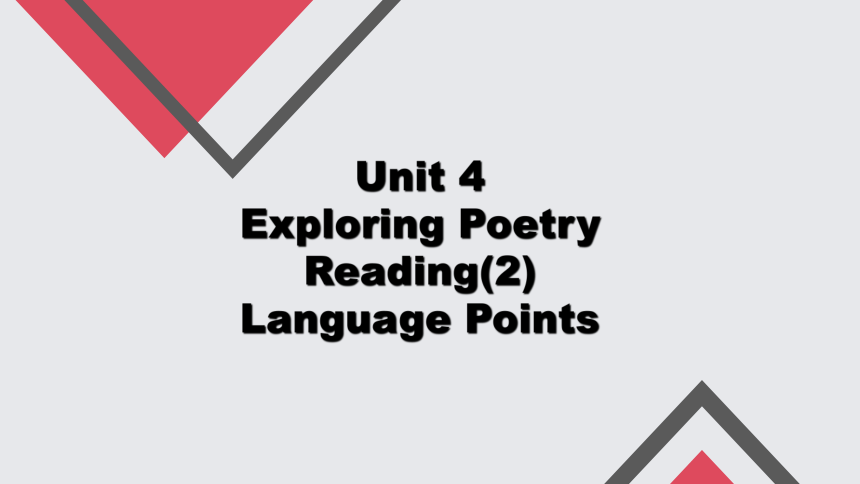
|
|
| 格式 | pptx | ||
| 文件大小 | 149.2KB | ||
| 资源类型 | 教案 | ||
| 版本资源 | 牛津译林版(2019) | ||
| 科目 | 英语 | ||
| 更新时间 | 2023-01-05 02:00:09 | ||
图片预览

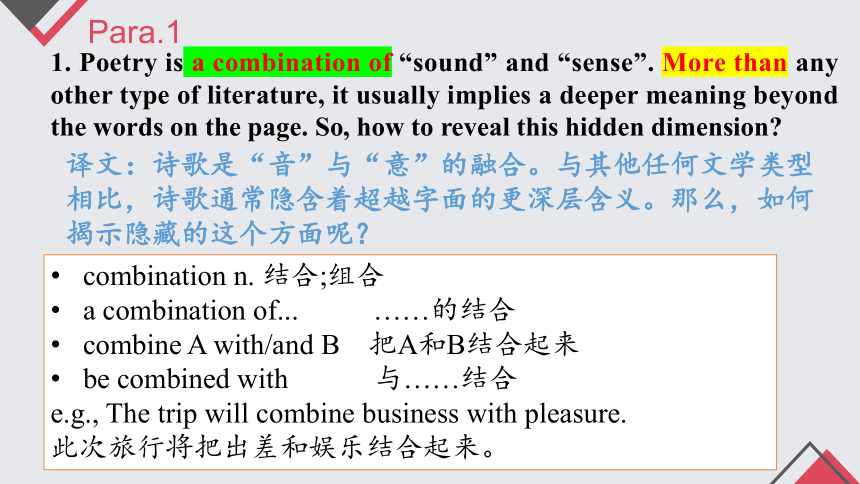
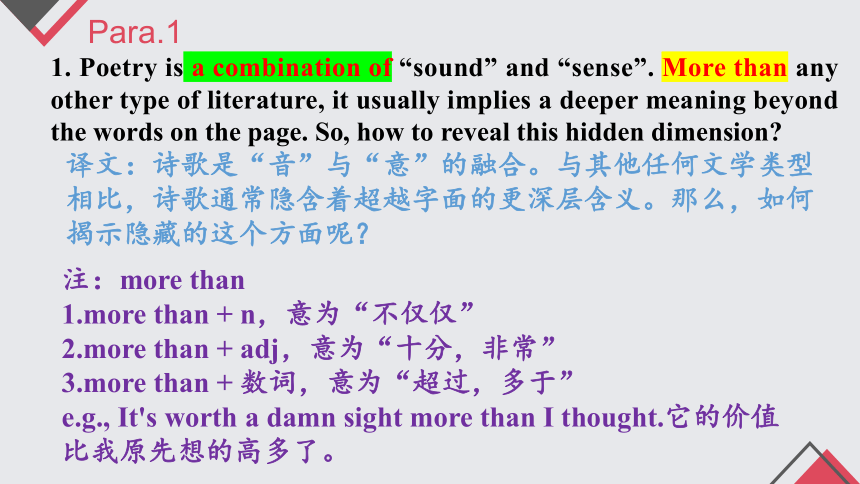
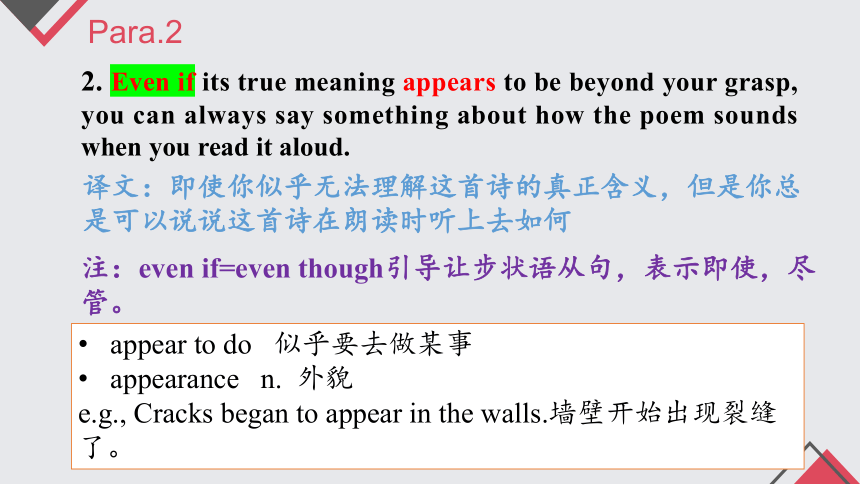
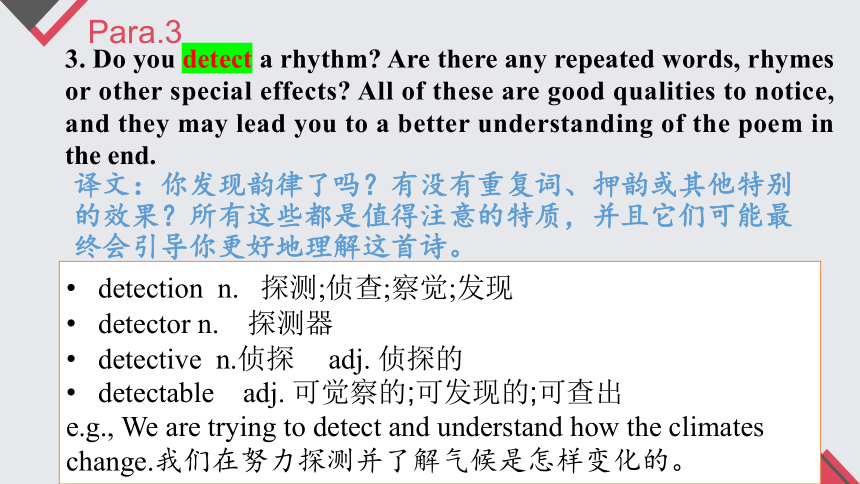
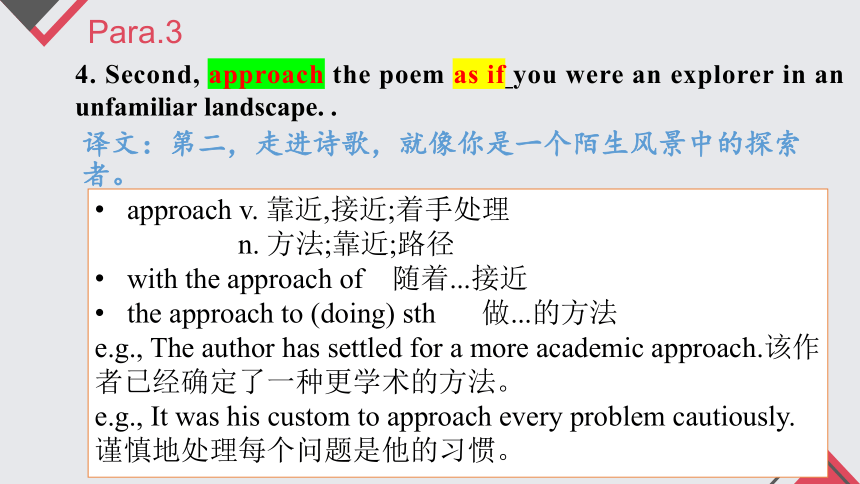
文档简介
(共12张PPT)
Unit 4
Exploring Poetry
Reading(2)
Language Points
Para.1
1. Poetry is a combination of “sound” and “sense”. More than any other type of literature, it usually implies a deeper meaning beyond the words on the page. So, how to reveal this hidden dimension
译文:诗歌是“音”与“意”的融合。与其他任何文学类型相比,诗歌通常隐含着超越字面的更深层含义。那么,如何揭示隐藏的这个方面呢?
combination n. 结合;组合
a combination of... ……的结合
combine A with/and B 把A和B结合起来
be combined with 与……结合
e.g., The trip will combine business with pleasure.
此次旅行将把出差和娱乐结合起来。
Para.1
1. Poetry is a combination of “sound” and “sense”. More than any other type of literature, it usually implies a deeper meaning beyond the words on the page. So, how to reveal this hidden dimension
译文:诗歌是“音”与“意”的融合。与其他任何文学类型相比,诗歌通常隐含着超越字面的更深层含义。那么,如何揭示隐藏的这个方面呢?
注:more than
1.more than + n,意为“不仅仅”
2.more than + adj,意为“十分,非常”
3.more than + 数词,意为“超过,多于”
e.g., It's worth a damn sight more than I thought.它的价值比我原先想的高多了。
Para.2
2. Even if its true meaning appears to be beyond your grasp, you can always say something about how the poem sounds when you read it aloud.
译文:即使你似乎无法理解这首诗的真正含义,但是你总是可以说说这首诗在朗读时听上去如何
appear to do 似乎要去做某事
appearance n. 外貌
e.g., Cracks began to appear in the walls.墙壁开始出现裂缝了。
注:even if=even though引导让步状语从句,表示即使,尽管。
Para.3
译文:你发现韵律了吗?有没有重复词、押韵或其他特别的效果?所有这些都是值得注意的特质,并且它们可能最终会引导你更好地理解这首诗。
3. Do you detect a rhythm Are there any repeated words, rhymes or other special effects All of these are good qualities to notice, and they may lead you to a better understanding of the poem in the end.
detection n. 探测;侦查;察觉;发现
detector n. 探测器
detective n.侦探 adj. 侦探的
detectable adj. 可觉察的;可发现的;可查出
e.g., We are trying to detect and understand how the climates change.我们在努力探测并了解气候是怎样变化的。
Para.3
译文:第二,走进诗歌,就像你是一个陌生风景中的探索者。
4. Second, approach the poem as if you were an explorer in an unfamiliar landscape. .
approach v. 靠近,接近;着手处理
n. 方法;靠近;路径
with the approach of 随着...接近
the approach to (doing) sth 做...的方法
e.g., The author has settled for a more academic approach.该作者已经确定了一种更学术的方法。
e.g., It was his custom to approach every problem cautiously.
谨慎地处理每个问题是他的习惯。
Para.3
译文:第二,走进诗歌,就像你是一个陌生风景中的探索者。
4. Second, approach the poem as if you were an explorer in an unfamiliar landscape. .
注:as if的虚拟语气.
1.表示与现在事实相反,谓语动词用“did/was/were”
He talks as if he knew what had happened.
2.表示与过去事实相反,谓语动词用“had +done”
The girl acted as if she had done it.
3.表示与将来事实相反,谓语动词用“would / could / might + do”
It looks as if it might rain soon.
Para.3
注:that引导限定性定语从句,主句为you will start to dig up clues, 从句为give you a greater understanding of the poem,从句不完整,缺少主语,先行词为clues, 充当从句的主语部分。
5. As you slowly explore your surroundings, you will start to dig up clues that give you a greater understanding of the poem.
译文:当你慢慢探索周围环境时,你会开始挖掘线索,这些线索会让你更好地理解这首诗。
Para.4
6. Third, if you are still struggling to interpret the meaning of a poem even with much painstaking effort, just have some patience. You cannot really understand a poem that you have only read once.
译文:第三,如果你下了很大的功夫可还是纠结于理解一首诗的意思,那就耐心一点吧。你不可能真正理解只读过一遍的诗。
interpret...as ... 把……理解为……
interpret from ...into ... 把……译为……
interpreter n. 译员
interpretation n. 解释;说明;阐明
e.g., She couldn't speak much English so her children had to interpret for her.她讲不了几句英语,所以她的孩子们得给她翻译。
Para.5
7. This may seem difficult at first, but when you finally make your great discovery, your efforts will be rewarded.
译文:这在一开始可能看起来很难,但当你最终做出伟大的发现时,你的努力会得到回报。
reward sb with sth 用某物奖励某人
reward sb for (doing) sth 奖励;奖赏;给以报酬
in/as a reward for 作为报答;作为…的报酬
rewarding adj. 有回报的
e.g., Winning the match was just reward for the effort the team had made.赢得比赛的胜利是全队付出努力应得的回报。
Para.6
8. Poems that are easy to understand are often less interesting than those that constantly reveal deeper and previously unrecognized meanings.
译文:相比容易理解的诗,那些不断展现更加深刻的、先前未发现的意义的诗常常更加有趣。
注:
在这个句子中,those=the poems
those是指代词,意思为“那些”,相当于“the+复数名词”,
that也有类似的用法, 意为“那个”代替的是“the+单数名词/不可数名词”。
Thanks
Unit 4
Exploring Poetry
Reading(2)
Language Points
Para.1
1. Poetry is a combination of “sound” and “sense”. More than any other type of literature, it usually implies a deeper meaning beyond the words on the page. So, how to reveal this hidden dimension
译文:诗歌是“音”与“意”的融合。与其他任何文学类型相比,诗歌通常隐含着超越字面的更深层含义。那么,如何揭示隐藏的这个方面呢?
combination n. 结合;组合
a combination of... ……的结合
combine A with/and B 把A和B结合起来
be combined with 与……结合
e.g., The trip will combine business with pleasure.
此次旅行将把出差和娱乐结合起来。
Para.1
1. Poetry is a combination of “sound” and “sense”. More than any other type of literature, it usually implies a deeper meaning beyond the words on the page. So, how to reveal this hidden dimension
译文:诗歌是“音”与“意”的融合。与其他任何文学类型相比,诗歌通常隐含着超越字面的更深层含义。那么,如何揭示隐藏的这个方面呢?
注:more than
1.more than + n,意为“不仅仅”
2.more than + adj,意为“十分,非常”
3.more than + 数词,意为“超过,多于”
e.g., It's worth a damn sight more than I thought.它的价值比我原先想的高多了。
Para.2
2. Even if its true meaning appears to be beyond your grasp, you can always say something about how the poem sounds when you read it aloud.
译文:即使你似乎无法理解这首诗的真正含义,但是你总是可以说说这首诗在朗读时听上去如何
appear to do 似乎要去做某事
appearance n. 外貌
e.g., Cracks began to appear in the walls.墙壁开始出现裂缝了。
注:even if=even though引导让步状语从句,表示即使,尽管。
Para.3
译文:你发现韵律了吗?有没有重复词、押韵或其他特别的效果?所有这些都是值得注意的特质,并且它们可能最终会引导你更好地理解这首诗。
3. Do you detect a rhythm Are there any repeated words, rhymes or other special effects All of these are good qualities to notice, and they may lead you to a better understanding of the poem in the end.
detection n. 探测;侦查;察觉;发现
detector n. 探测器
detective n.侦探 adj. 侦探的
detectable adj. 可觉察的;可发现的;可查出
e.g., We are trying to detect and understand how the climates change.我们在努力探测并了解气候是怎样变化的。
Para.3
译文:第二,走进诗歌,就像你是一个陌生风景中的探索者。
4. Second, approach the poem as if you were an explorer in an unfamiliar landscape. .
approach v. 靠近,接近;着手处理
n. 方法;靠近;路径
with the approach of 随着...接近
the approach to (doing) sth 做...的方法
e.g., The author has settled for a more academic approach.该作者已经确定了一种更学术的方法。
e.g., It was his custom to approach every problem cautiously.
谨慎地处理每个问题是他的习惯。
Para.3
译文:第二,走进诗歌,就像你是一个陌生风景中的探索者。
4. Second, approach the poem as if you were an explorer in an unfamiliar landscape. .
注:as if的虚拟语气.
1.表示与现在事实相反,谓语动词用“did/was/were”
He talks as if he knew what had happened.
2.表示与过去事实相反,谓语动词用“had +done”
The girl acted as if she had done it.
3.表示与将来事实相反,谓语动词用“would / could / might + do”
It looks as if it might rain soon.
Para.3
注:that引导限定性定语从句,主句为you will start to dig up clues, 从句为give you a greater understanding of the poem,从句不完整,缺少主语,先行词为clues, 充当从句的主语部分。
5. As you slowly explore your surroundings, you will start to dig up clues that give you a greater understanding of the poem.
译文:当你慢慢探索周围环境时,你会开始挖掘线索,这些线索会让你更好地理解这首诗。
Para.4
6. Third, if you are still struggling to interpret the meaning of a poem even with much painstaking effort, just have some patience. You cannot really understand a poem that you have only read once.
译文:第三,如果你下了很大的功夫可还是纠结于理解一首诗的意思,那就耐心一点吧。你不可能真正理解只读过一遍的诗。
interpret...as ... 把……理解为……
interpret from ...into ... 把……译为……
interpreter n. 译员
interpretation n. 解释;说明;阐明
e.g., She couldn't speak much English so her children had to interpret for her.她讲不了几句英语,所以她的孩子们得给她翻译。
Para.5
7. This may seem difficult at first, but when you finally make your great discovery, your efforts will be rewarded.
译文:这在一开始可能看起来很难,但当你最终做出伟大的发现时,你的努力会得到回报。
reward sb with sth 用某物奖励某人
reward sb for (doing) sth 奖励;奖赏;给以报酬
in/as a reward for 作为报答;作为…的报酬
rewarding adj. 有回报的
e.g., Winning the match was just reward for the effort the team had made.赢得比赛的胜利是全队付出努力应得的回报。
Para.6
8. Poems that are easy to understand are often less interesting than those that constantly reveal deeper and previously unrecognized meanings.
译文:相比容易理解的诗,那些不断展现更加深刻的、先前未发现的意义的诗常常更加有趣。
注:
在这个句子中,those=the poems
those是指代词,意思为“那些”,相当于“the+复数名词”,
that也有类似的用法, 意为“那个”代替的是“the+单数名词/不可数名词”。
Thanks
同课章节目录
- Unit 1 Food matters
- Welcome to the unit
- Reading
- Grammar and usage
- Integrated skills
- Extended reading
- Project
- Unit 2 The Universal Language
- Welcome to the unit
- Reading
- Grammar and usage
- Integrated skills
- Extended reading
- Project
- Unit 3 The art of painting
- Welcome to the unit
- Reading
- Grammar and usage
- Integrated skills
- Extended reading
- Project
- Unit 4 Exploring poetry
- Welcome to the unit
- Reading
- Grammar and usage
- Integrated skills
- Extended reading
- Project
